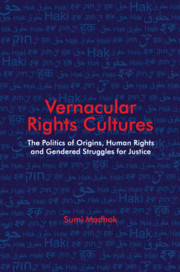 Vernacular Rights Cultures
Vernacular Rights Cultures Book contents
- Frontmatter
- Dedication
- Contents
- Acknowledgements
- 1 An Introduction: Vernacular Rights Cultures and Decolonising Human Rights
- 2 Refusing the Politics of Origins
- 3 Assembling a Feminist Historical Ontology of Haq
- 4 The Political Imaginaries of Haq: ‘Citizenship’ and ‘Truth’
- 5 Resisting Developmentalism and the Military: Haq as a Cosmological Idea and an Islamic Ideal
- 6 Conceptual Diversity, Feminist Historical Ontology and a Critical Reflexive Politics of Location
- References
- Index
1 - An Introduction: Vernacular Rights Cultures and Decolonising Human Rights
Published online by Cambridge University Press: 31 July 2021
- Frontmatter
- Dedication
- Contents
- Acknowledgements
- 1 An Introduction: Vernacular Rights Cultures and Decolonising Human Rights
- 2 Refusing the Politics of Origins
- 3 Assembling a Feminist Historical Ontology of Haq
- 4 The Political Imaginaries of Haq: ‘Citizenship’ and ‘Truth’
- 5 Resisting Developmentalism and the Military: Haq as a Cosmological Idea and an Islamic Ideal
- 6 Conceptual Diversity, Feminist Historical Ontology and a Critical Reflexive Politics of Location
- References
- Index
Summary
Haq is the Arabic word for a right. It is also the word for a right in Urdu, Persian, Turkish and Hindustani. The first recorded existence of haq can be traced to classical Hebrew and it is also found in the older Semitic languages such as Aramaic and Mendian. Over the centuries, the word has travelled across the globe to become the principal word to signify a right in South Asia, the Middle East and North Africa. Haq or hukk appears in Hindustani and Urdu lexicon through the influence of Persian in the Indian subcontinent where it cuts across geographical, religious and linguistic boundaries to become the principal word deployed to claim rights by subaltern groups in northwestern India and Pakistan. Not surprisingly, in the course of its travels, it has gathered complex meanings and iterations that inform political imaginaries, subjectivities and political cultures of rights and rights claim-making. What can the presence of haq in the vernacular and its use tell us about contemporary articulations, practices and discourses of rights and human rights in ‘most of the world’? What can it tell us about the different contexts of rights, meanings of rights, and about the conceptual languages of rights in ‘other’ parts of the globe? What does an attention to haq tell us about the forms of rights politics, subjectivities and the processes of political subjectivation these engender? And, furthermore, what can it tell us about the ‘other’ political cultures, imaginaries, contestations and struggles for rights? How can scholarly investigations of contemporary struggles for haq inform global human rights scholarship? And how useful is the global human rights framework for conceptually capturing political struggles for haq?
In South Asia, haq is a key literal and conceptual term used to signify a right or an entitlement in contemporary subaltern political struggles. Many at the forefront of these multitudinous subaltern rights mobilisations in the Indian subcontinent are engaged in struggles for their ‘life rights’. While some are resisting precarity and dispossession heralded in by neoliberal developmentalism and its championing of privatisation of natural resources, others are struggling to redefine the substantive content of existing formal constitutional guarantees and are mobilising to put in place new and expanded entitlements.
- Type
- Chapter
- Information
- Vernacular Rights CulturesThe Politics of Origins, Human Rights, and Gendered Struggles for Justice, pp. 1 - 33Publisher: Cambridge University PressPrint publication year: 2021


